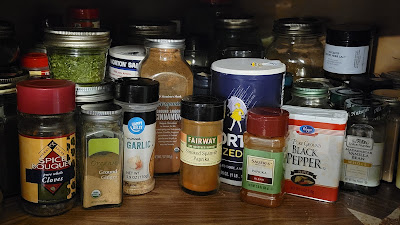* I see what you did there, David. -- The Editrix
Tips for preparing longer term spice storage:
- Buy spices with expiration dates as far out as possible.
- Keep the container sealed.
- If the container is opened, use a dehydrator or the oven set on low to force out as much moisture as possible.
- Each container should have its own fresh oxygen absorber.
- Store the spices in a cool dark place.
If working with fresh
herbs and spices:
- Wash them carefully.
- Pluck any wilted leaves.
- Remove the stems.
- Remove as much moisture as possible in a dehydrator or the oven set on low.
- Seal in containers no larger than necessary.
- Each container should have its own fresh oxygen absorber.
- Store the spices in a cool dark place.
With proper care, a vacuum sealer can be used to store
larger quantities of spices.
A glimpse into the author's spice cabinet
While the variety of spices is legion, certain seasonings
are more frequently encountered. As everyone has different preferences, the
spices chosen can vary significantly.
Salt
Probably the most common spice used throughout the world is
salt, to the point it’s part of common parlance. Look back at my first
sentence for one example; another is referring to something necessary but boring
as “Like rice without salt.” Roman legions even received part of their pay in
salt, from which the word salary is derived.
Modern table salt is not just simple NaCl, but has
anti-caking agents and iodine added for storage and health
purposes respectively. (The reason we often see a few grains of rice in a salt shaker is they
act as a basic moisture absorber.) Salt is fairly easy to store long term, and
is unlikely to lose any flavor.
Pepper
Black pepper is almost certainly the next most common spice. Ground pepper's flavor will deteriorate over time once unsealed: leaving peppers in kernel form increases storage life, but adds another
complication in the need for a grinder.
Other Spices
Depending on individual taste, both garlic powder and ginger
powder are two excellent choices as they add a good amount of flavor for their
volume. Though, is there ever such a thing as enough garlic?
Chili powder, paprika, and cinnamon (either stick or ground)
are other spices that offer a good bang for the buck and bulk. The first two
also come in a wide variety and can be tailored to appropriate foods and
cooking method.
When storing leafy spices, such as parsley, sage, rosemary,
or thyme, keep in mind that they will lose flavor more quickly, and possibly develop mold, if not
very thoroughly dehydrated. For home use, herbs and spices can be stored in the freezer
for quite a while without loss of flavor, though some will suffer in
appearance.
Remember, the plural of spice is spice, and also spices.



David:
ReplyDeleteThanks a MILLION!!!
My neighbors and my current wife had been complaining about the smell but your advice helped immensely. The washing carefully, the dehydrating, oxygen absorbing packets (is used tons of them) and the airtight lid.
Always remember: Spice is the plural of "Spouse"!